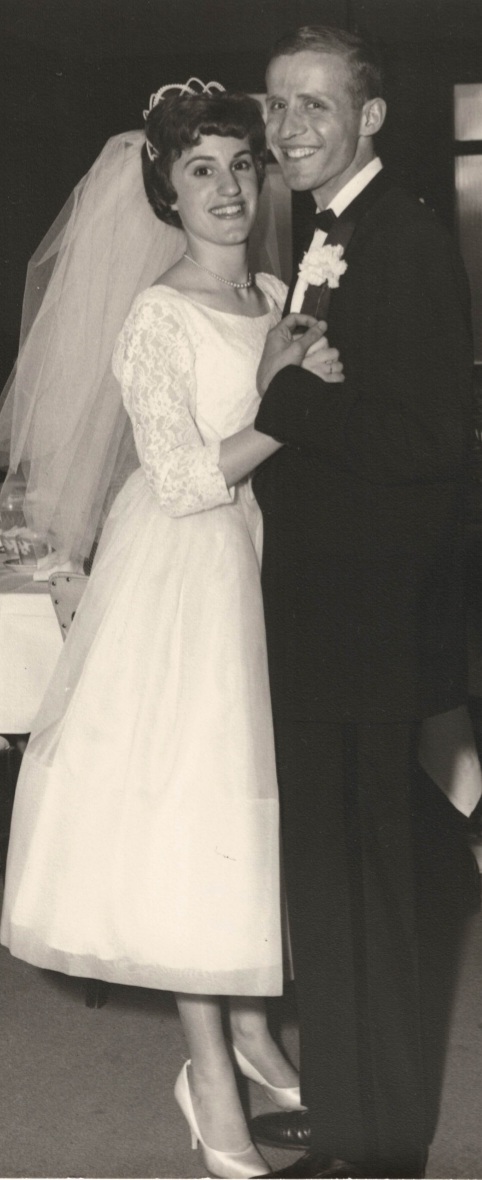Today, April 8, 2022, my parents celebrate 60 years of marriage. None of their peer from my childhood made it to their 60th anniversary. They now have. I write to celebrate that achievement.
Every marriage is inscrutable to those outside but, even as adults, children have an especially difficult time understanding their parents–their views colored by their childhood. I haven’t even lived in their home the last 2/3rds of their marriage. Thus, I observed their lives opaquely. My dad has always been a private person. Neither of my parents likes to dwell on or discuss negative feelings. While I have thoughts on how they have able to sustain a lifelong marriage, I’m not really certain of how they endured marriage’s inevitable rough patches. My parents provide less unsolicited advice than most, but I don’t recall them ever providing advice on marriage. Any thoughts I have on how they sustained their marriage is based more on inference than on what they’ve told me.
That said, their marriage has been a successful one. Moreover, it succeeded in a culture that, in a very short period of time, shifted from (outwardly) chaste to libertine, while encountering the leading edge of second-wave feminism. This confluence of social changes rapidly undermined the bedrock of traditional marriages. The San Fernando Valley in the 1970’s (they have lived in Woodland Hills, California since 1965) was the porn capital of the world. Los Angeles in the late 1960’s/early 1970’s didn’t invent swinging but it was likely the first bourgeois culture in which swinging was prevalent. A culture of “if it feels good, do it,” is inimical to monogamous relationships. Many marriages of my parents’ contemporaries could not survive this more libertine culture.
Further, as second-wave feminism undermined the assumptions behind traditional marriage, many of my mother’s peer chafed at their gender-defined roles. These women became more self-sufficient as their children grew more independent. Eventually that self-sufficiency, and the unwillingness to remain in a traditional gender role, led to divorce. While my mother attended graduate school in the late 1970’s, eventually obtaining a Master’s Degree and resuming her career, she remained the primary homemaker while my dad remained the primary wage-earner.
Temperamentally (not politically), my parents remained the conservative Jewish Midwesterners of their upbringings (they were both raised in Columbus, Ohio, and moved to Southern California in 1963). Therefore, their marriage wasn’t torn asunder by this libertine culture or changing gender expectations. For sixty years, my parents did what folks in a traditional marriage were supposed to do, even if my mother chafed at certain aspects of the gender-based roles of a traditional marriage.
My dad worked and generated sufficient wealth to raise three children in some material comfort. If my siblings and I didn’t have a lot of luxuries growing up, we never had to worry about necessities. Our educations were always stressed. There was money for private school for my sisters and private college for me. Meanwhile, my mother ran a home that was always clean and maintained. We had nice dinners–often fancy dinners on the Sabbath. I was never embarrassed or discouraged to have friends over. I found the suburbia of my childhood stultifying but there are advantages to living in a nice home, in a nice neighborhood, with a nice mother. Many of my family court clients would be thrilled with the calm boredom of my childhood.
If you’d asked my parents on their wedding day what they hoped for the future, they would have said a relationship based upon sustained love, that produced happy, healthy children, and providing enough material comfort that money would not be a constant stressor. Unlike many of the upper-middle class Jewish strivers of their peer, the goals they pushed for their children were more self-sufficiency and ethical behavior than academic and professional success. Academics were important but being trustworthy, kind, and diligent were more important. Their three children all have stable careers, solid marriages, and children who bring them joy. I know my parents look upon their legacy of children and grandchildren as their proudest achievement; this I know because they often mention it.
Further, my parents have really enjoyed their life together and continue to do so. In addition to maintaining a home they love and raising children, they’ve travelled much of the world, built a vacation home in Nevis, and regularly engage in cultural and leisure activities. As a couple, they have celebrated their own successes, their children’s successes, and, increasingly, their grandchildren’s successes. They remain mutually supportive, which, as the infirmities of old age become more frequent and severe, remains a great comfort. They’re also perfectly content to simply chill with each other at home.
My own marriage has survived rough patches through a combination of fear, love, and stubbornness. My assumption is that is how my parents got through theirs. Knowing that they could endure periods in which they really didn’t like each other and come through it still in love and committed to the marriage has sustained my marriage. Fear of the unknown may be a poor reason to remain married but sensible people avoid unnecessary risk. Stubbornness (for me, a general unwillingness to renege on a solemn vow made in the presence of friends and family) can shade into inertia but it can also be a source of integrity. And love, for all its inscrutability (is love finding extraordinary what to outsiders appears ordinary or is it the capacity to recognize the extraordinary that the world remains blind to?) really does sustain lifelong marriage.
One view of marriage I know I share with my parents is that creating a sustained and loving one can be life’s most fulfilling achievement. I am well read in feminist, socialist, and libertarian critiques of matrimony: that it primarily exists to sustain patriarchy, consumerist culture, or social conformity. These critiques all have elements of truth to them. Many children of divorced parents or adults my own children’s age see a stable, mutually supportive marriage as either unachievable or not worth pursuing. While I understand their viewpoint, I find it sadly pessimistic.
The conservative values of a mutually supportive marriage, in which spouses sometime subordinate their own desires to the greater good of the partnership, encourages the creation of stable families and communities. That very stability enables the innovation and growth that enlarges a culture without atomizing it. The bonds of matrimony enable two people to rely upon each other rather than civic or governmental institutions for support–and often enables those participants to devote some of their energies to the civic institutions that sustain the culture. It also provides some relief from the existential aloneness that is simply the human condition.
From the vantage point of someone married a bit more than half as long–with children mostly fledged–I already feel like an “old” married. At many of the weddings my wife and I attend, we’ve been married longer than the bride or groom’s parents. A thirty-year marriage seems like an achievement: to double that is remarkable. My parents often express their pride in me; today I am proud of them.
So, on the occasion of my parents’ 60th anniversary, I end with a photograph from their wedding and a very recent photograph of them together. Mazel tov.


Very nice sentiments Greg. My wife and I will celebrate our 55th anniversary this month. You are correct that such longevity is a real achievement in today’s world. Perhaps on our 60th, God willing, one of my children will pen a narrative such as you have done today.
Yes, it was such a beautiful narrative. Lee and I were extremely touched. It is so special that I printed it out and keep it by my nightstand. But then our Greg as a special thoughtful son.
All the best to you and your wife for Many more anniversary celebrations.
That was a very touching and warm tribute. You have been truly blessed to experience their love together all these years . Thanks for sharing.
Beautiful tribute.
Beautiful comments
Greg, that was a beautifully written, and a wonderful tribute to your parents. Wishing them both a very Happy Anniversary.
Wonderful tribute ❤️. Have such admiration and respect for those staying in a relationship “til death do we part”.
Great tribute. Good for them!
Great blog entry! They did well raising a son like you. As usual, very well writted. “L’chaim.”